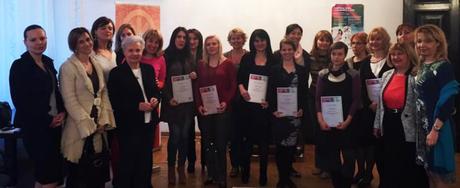
Recently I visited Serbia to attend events for a women’s mentorship program led by our partner, the Association of Business Women in Serbia (ABW). I was excited to speak with the local women entrepreneurs, because I had read literature on how women in business face serious barriers in Serbia despite the country’s history of socialist emphasis on gender equality. What I saw from Serbia’s women entrepreneurs was impressive.
In Serbia, men and women have similar levels of education and equal treatment in labor legislation. When it comes to access to economic opportunities, however, it’s a different story. The employment rate for working age women is over 20 percent lower than that of men. Women-owned enterprises (small businesses, limited liability companies, partnerships, etc.) make up only 26 percent of all registered businesses and companies active in the Serbian economy.
Economic growth has been anemic since 2009 and the country slipped into recession in 2014, due in part to severe floods. Despite overcoming the setbacks of the 1990s — conflict, international sanctions, and breakup of the former Yugoslavia — and being in negotiations to join the European Union, Serbia now faces an unemployment rate of nearly 17 percent. The unemployment rate is even higher among youth — 47 percent. Many economists have argued that the answer to revitalizing Serbia’s economy is encouraging more women into the private sector, especially to start small and medium enterprises. And ABW for the past 10 months has been doing exactly this: inspiring and supporting entrepreneurship among women throughout the country.
Because most start-ups fail within the first few years of operation, the mentees for the program were women with new businesses that have been operating for less than three years. ABW facilitated over 20 mentorship pairs between new women business owners and ABW members with established businesses throughout Serbia.
I went to Subotica (in the northern part of the country), Valjevo (in the south), and Belgrade to attend the final events for the project. At each event, ABW members from the region shared how they overcame the challenges of running a business in Serbia, and mentorship participants presented what they achieved through this program.
It was obvious that though women business owners may not be well-represented in numbers, they sure contribute to the country’s economy. I met resilient women of all ages who started companies during difficult economic times and their profiles were vastly different. I spoke with the first registered female owner of a rakija producer, young twins who run an accounting firm together, an owner of an agritourism farm, a young yacht and jet designer, a founder of a high-quality chocolate company, and the founder and CEO of an international fashion company.
What they all had in common was their strong desire to support and seek advice from other women entrepreneurs. The mentees commented that they gained confidence and expanded their networks through this program, while the mentors enjoyed guiding the new entrepreneurs. Moreover, the mentors also gained new perspectives. As one mentor in Subotica told me, she became more energized to revamp her own firm with new tools that her mentee from the younger generation is using to do business.
Facilitating the mentorship program through an association was also very practical. Whenever a mentor did not have an answer for her mentee, the mentor sought other ABW members for assistance. For instance, when one mentor had expertise in marketing but not in finance, the mentoring pair approached an ABW member who was a CPA for help. Because ABW already has established network of professionals, it was easy for the participating mentoring pairs to seek and find expertise within the association members.
While the formal mentorship program itself has concluded, all of the participants told me that they will continue staying in touch with one another. I hope that they do, so that more aspiring women entrepreneurs in Serbia will gain confidence to follow their dreams and help propel growth of the country.
Maiko Nakagaki is a Program Officer for Global Programs at CIPE.

